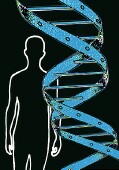
TUESDAY, Sept. 13 (HealthDay News) — Researchers have found dozens of new genetic variants involved in high blood pressure, heart disease and stroke.
Although more than 300 genes for cardiovascular diseases have been identified in the past few years, scientists from Johns Hopkins have recently identified 29 more DNA sequence variations. The findings may lead to new developments in treatments for heart disease and stroke, they reported.
“A genetic risk score that adds up the effects of all of these variants shows that the more of these variants an individual has, the greater are his or her chances of having hypertension [high blood pressure], left ventricular wall thickness, stroke and coronary artery disease,” one of the study’s lead authors, Aravinda Chakravarti, a professor of medicine, pediatrics and molecular biology and genetics at the McKusick-Nathans Institute of Genetic Medicine at Johns Hopkins, explained in a Hopkins news release.
In the study, researchers analyzed the systolic and diastolic blood pressure levels (the maximum and minimum pressures exerted on the arteries) and genetic information of more than 200,000 people around the world.
The investigators also found the same common genetic changes associated with hypertension among Europeans is often found among Asians and Africans, according to the study published in the Sept. 11 issue of Nature.
In a separate study, published in Nature Genetics, the same researchers also identified six more changes in parts of the genome, or genetic blueprint, that affect blood pressure by focusing on two different measures: pulse pressure (the difference between systolic and diastolic blood pressure) and mean arterial pressure (a weighted average of systolic and diastolic blood pressure).
“It’s like using four different cops to find the same culprit,” added Chakravarti. “The more ways we search for blood pressure genes, the better our ability to understand hypertension, whose effects are not uni-causal.”
The newly identified gene variations could help scientists develop new treatments for heart disease, the study authors noted.
Besides lifestyle contributions, “your blood pressure is a function of these genes we just identified, as well as perhaps a hundred others we haven’t found yet,” Chakravarti explained in the news release. “By revealing the genetic architecture of blood pressure, both studies will help us to understand the biology of cardiovascular diseases and stroke, and, eventually, may lead to better therapies.”
More information
The U.S. Centers for Disease Control and Prevention provides more information on heart disease risk factors.

